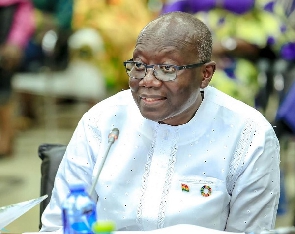 Finance Minister, Ken Ofori-Atta
Finance Minister, Ken Ofori-Atta
Non-governmental organisation, Send Ghana has implored the government of Ghana to ensure it applies equity for funding allocations made for social sector ministries in the country’s budget statements and economic policies.
According to SEND Ghana, a careful analysis of budget statements by the government from 2019 to 2023, showed inequity in expenditure allocation for some major social sector ministries.
The organisation notes that this defeats the quest to develop the country’s human capital.
“A five-year (2019-2023) analysis of budgetary allocation for the major social sector Ministries, Departments, and Agencies (MDAs), such as Health, Education, and Gender, Children, and Social Protection (MoGCSP) show inequity in expenditure allocation. The Education Ministry continues to receive the largest budget allocation as a portion of the social sector MDA budget, followed by the Ministry of Health, with the Ministry of Gender, Children, and Social Protection. Ministries receiving the least among the three MDAs. Although investment in the social sector as a whole is critical to building the country’s human capital development, the MoGCSP’s mandate in coordinating most of our social interventions and ensuring the protection of vulnerable populations, especially women and children, is even more imperative,” a report by SEND Ghana on the government’s budget for 2023 noted.
In the area of health, the organisation shared concern about the failure of the government to ensure that levies collected for the health sector are allocated to sector.
“The budget statement over the past five years shows increases in revenue from the NHIL and SSNIT contribution to the NHIF. However, only a percentage is transferred into the NHF with no information on what uses the remaining funds is put to. The introduction of the electronic renewal system has increased active membership of the NHIS to more than half of the population, thus requiring more funds to purchase healthcare for members. Yet, the ministry of finance since 2020 transfers less than 50% of allocations to the NHIA according to the MOH 2021 holistic report, thus affecting claims payment. Many accredited health facilities have in effect resorted to operating cash and carry along the NHIS where 42% of the poorest members are paying out of pocket for healthcare,” it said.
The preliminary assessment report issued by SEND Ghana covered five government ministries including Health, Education, Agriculture, Sanitation and Water Resources, as well as Gender, Children and Social Protection.
The analysis among other things “poor budget execution and overdependence on donor funding across the sectors” under review.
According to SEND Ghana, these issues not only become a weakness in the budget but also pose a threat to the attainment of the country’s needed developmental outcome and achieving the Sustainable Development Goals (SDGs).
GA/WA